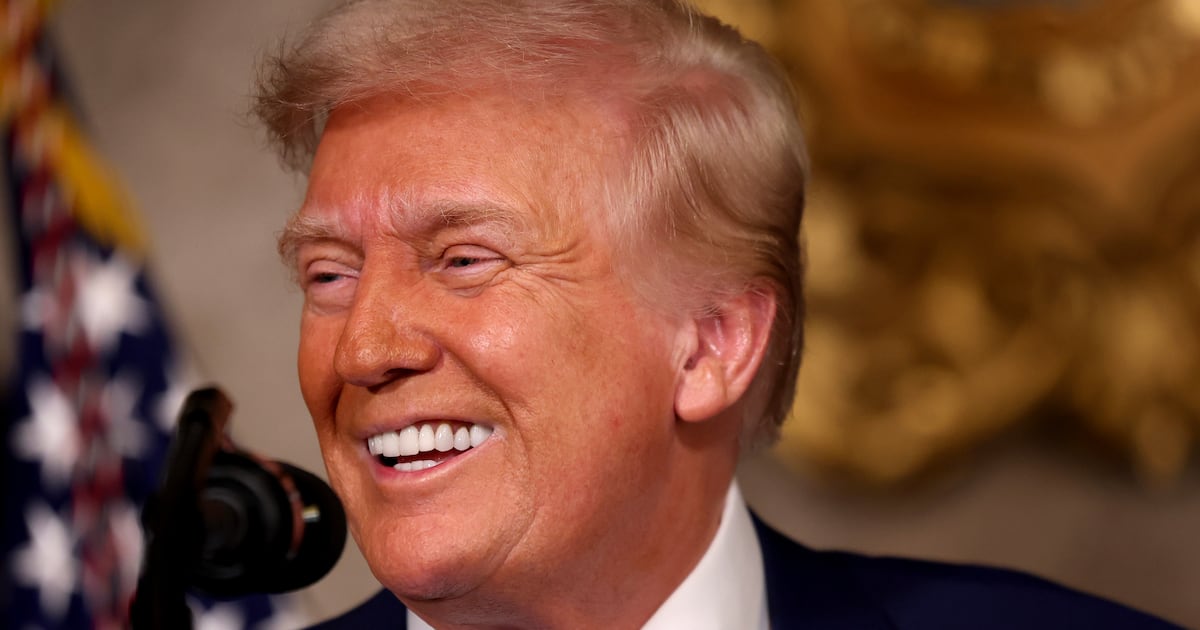MIAMI—Gov. Ron DeSantis and President Donald Trump have tightly wound their political fates together in Florida, a state that amounts to a must-win if the president hopes to serve another term in the White House.
But as the nation hurtles toward a contentious general-election contest, Florida has emerged as a key national hot spot for the resurgent coronavirus pandemic. This even as the president is primed to try to use the state as a show of strength for his now-relocated Republican National Convention nomination acceptance speech in August—a plan that is already causing anxiety among some locals.
And the rapid ascent of COVID-19 in the Sunshine State has proven precarious for DeSantis’ standing in Florida, raising the prospect that a reopening some residents and experts say has been rushed could mean trouble for the president come November.
The situation in the state grew even more troubling Friday, according to the Miami Herald, as the state smashed its single-day record set this week for new cases with a count of close to 9,000 testing positive. The previous high, according to the newspaper, came Wednesday when 5,508 new COVID-19 cases marked a new one-day record in the state.
“If you look around the country, most governors, regardless of party, saw their numbers rise” during the early part of the pandemic, noted Jeff Garcia, a Democratic political consultant based in Miami. He pointed to a decline for DeSantis from 58 percent to 51 percent in approval in an April analysis of polls by FiveThirtyEight—long before the recent surge in cases. Meanwhile, governors of 14 other states hit hard by the pandemic, such as Michigan, Washington, and New York, experienced double-digit positive gains.
“DeSantis is in a rare category,” added Garcia. “He is not overwhelmingly disliked, but he has seen a precipitous drop in his approval rating.”
Florida, on the other hand, is among the states showing the sharpest trend upward in confirmed new COVID-19 cases in recent days, according to Johns Hopkins University. And in an analysis last week, the PolicyLab at Children’s Hospital of Philadelphia voiced concern that “Florida has all the makings of the next large epicenter.”
That’s the fear shared by Bernard Ashby, a Florida-based cardiologist and health-policy expert. Despite Florida having a large Medicare-eligible population and many people vulnerable to COVID-19, the state’s lead physician for the Committee to Protect Medicare said the governor's response to the pandemic has been more economically focused, “with public health being an afterthought.”
“I would definitely think that voters, especially voters who fall into that vulnerable population, would obviously be concerned by the lack of leadership from the federal level and the state level regarding the handling of the COVID-19 pandemic,” Ashby said, looking ahead to November’s general election.
A spokesman for DeSantis did not respond to an email seeking comment on whether his handling of the coronavirus may hurt President Donald Trump’s ability to win the state in November. But on Thursday, DeSantis seemed to recognize the challenges the spike poses for Florida’s reopening moving forward.
“We are where we are,” DeSantis told reporters when asked about the state’s reopening. “I didn’t say we’re going to go on to the next phase.”
Before the pandemic, observers say DeSantis had made gains with voters after his narrow victory over Democrat Andrew Gillum in 2018. But the pandemic appears to have set the governor in a more fluid position politically amid concerns over his administration’s response.
Rod Deal wasn’t a fan of DeSantis when the Republican ran for governor in 2018. But even after voting for Gillum, the 38-year-old Miami-based photographer’s resistance faded and he warmed to DeSantis shortly after the GOP leader took office.
“I thought he was also making strides in solar power energy and increasing teachers’ salaries,” Deal said. “I thought he was putting the people’s needs first. From what I saw, I thought I will vote for him next time.”
Then the coronavirus pandemic hit, and Deal’s positive impressions of DeSantis evaporated.
“It was only in the last three months that I started wondering, ‘What the hell is up with this dude?” Deal said. “Opening up the entire state with the COVID numbers going up was horrible.”
While most governors during the pandemic have seen a “rally around the flag” dynamic, a poll detailed by The Washington Post in May found that DeSantis had one of the lowest coronavirus approval ratings among the nation’s 50 governors. Still, it’s worth noting that the Florida governor did fare 15 points better than the president.
J. Edwin Benton, a political science professor at the University of South Florida, said if the spiking in Florida is due to unwise decisions by DeSantis, then that is going to reflect badly, and not just on the governor.
“If he has to own that and if people are looking to DeSantis as a role model for the state and he doesn’t look good, then by implication it’s going to have a similar if not equal effect on Donald Trump’s chances of winning the state in November,” Benton said.
The governor dragged his feet on issuing a stay-at-home order while the virus swept through the country earlier this year, finally relenting on April 1. It’s part of a larger approach that has invited rebuke from within the rank and file of state government.
In May, Rebekah Jones, a former Florida Department of Health data staffer, alleged to media outlets that she was forced out of her position after declining to alter state health data. In a recent media blitz, she has aggressively questioned the authenticity of the state’s COVID-19 figures.
“I have multiple sources at DOH who have just told me they have been instructed this week to change the numbers and begin slowly deleting deaths and cases so it looks like Florida is improving next week in the lead-up to July 4, like they’ve “made it over the hump,” Jones tweeted earlier this week.
The situation also led to a public challenge to DeSantis on Thursday from Florida Agriculture Commissioner Nikki Fried. In a statement, the Democrat asked the governor to “issue a statewide mask order,” pointing to the state’s “skyrocketing COVID-19 cases” as the reason.
Leading Republicans in Jacksonville—where Trump is slated to deliver to his acceptance speech, after North Carolina officials refused to allow him to pack an arena there—haven’t shown similar worries. Dean Black, Duval County’s GOP chairman, dismissed such concerns, telling The Daily Beast, “We believe that the governor and our mayor are handling things responsibly.”
“And the concern that this is somehow irresponsible and reckless is not true,” Black said.
Just weeks ago, some were charging that DeSantis had been treated unfairly by reporters over his COVID-19 response. “Where Does Ron DeSantis Go to Get His Apology?” a May 20 headline in The National Review asked.
Throughout the pandemic, DeSantis has remained a strong ally of the president. Trump has returned the favor, praising the governor’s approach to the outbreak. Republicans in the state didn’t seem to see much daylight between the two.
“You can’t make everybody happy and you certainly can’t make the media happy,” said Armando Ibarra, president of Miami Young Republicans. “It’s been a measured reopening based on a plan consistent with the right practices.”
The Young Republicans head even suggested the number of people with COVID-19 was likely higher than public figures, but that the disease’s deadly impact may be overstated.
“We are seeing data now that there’s a big number of undiagnosed positives walking around who haven’t been tested,” Ibarra said. “That tells a different story about this virus; that it’s a lot less deadly than being reported.”
The governor himself has shown concern about surges in his state, saying this week, “What we've seen particularly over the last week is a real explosion in new cases amongst our younger demographics.” Critics say that’s what makes reopening so dangerous.
On Wednesday, New York Gov. Andrew Cuomo, along with the leaders of New Jersey and Connecticut, announced that people arriving “from states with significant community spread of COVID,” would need to “quarantine for 14 days.” That would include Florida, along with states like Texas, South Carolina, and North Carolina, among others.
Hours later, DeSantis appeared at a local school for a bill-signing his office touted as being “dedicated to raising teacher salaries in Florida” with funding of $500 million in play. While several masked individuals stood behind him and another woman looked on from under a face shield, the governor waited until after signing the legislation to focus on the virus.
Even then, he wasn’t calling for a second shutdown or imposing a mask requirement, like North Carolina’s Democratic governor.
The Republican did don a mask as others spoke. After signing the bill, however, he playfully handed out pens to those around him. He then reminded people to avoid closed spaces with poor ventilation, crowded places, and close contact spaces.
DeSantis grew irritated when he was asked about Jones’ claims about the state’s coronavirus data.
“You guys have been on the conspiracy bandwagon for months. You have no evidence for it,” DeSantis said. “You need to move on. I mean, you really do. It’s embarrassing at this point.”
—With additional reporting from Pilar Melendez









